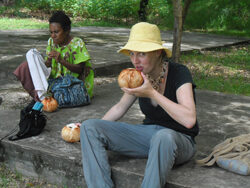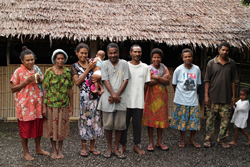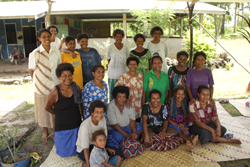ABM Archive Website
THIS WEBSITE CONTAINS ARCHIVE MATERIALS FOR HISTORICAL REFERENCE ONLY
For up-to-date information, including our latest appeals, news, and resources, please visit our current website.
Changing Lives in Dogura Diocese
 |
| Isabel keeping cool with some coconut juice (Rachael Inuwai, ACPNG Literacy Officer on left). |
ABM’s former Project Officer Isabel Robinson tells of her monitoring trip to Papua New Guinea and of the success of the community development work in Dogura Diocese.
After a 4 hour wait at Port Moresby airport, Air Niugini kindly announced that the flight to Alotau, capital of Milne Bay Province, was cancelled, and all passengers were to return to the airport the next morning.
Thankfully, this was not a bad omen for the week ahead. My January monitoring visit to Dogura Diocese was a testament to the staff of ACPNG and what they are achieving in the rural communities of Milne Bay.
On Saturday morning, I was met at Alotau airport by Constance Mogina. Constance is the Diocesan HIV Officer for Dogura, and a long-serving staff member of the Anglican Church of PNG. Together we made our way to Awaiama, stopping off to pick up a large drum of dinghy fuel on the way. It is expensive to operate in PNG, especially so in a Diocese that has very few roads. Travelling by dinghy is the most efficient means, but the cost of fuel is high.
Calm seas, flying fish, and Adult Literacy
The seas were calm on our journey to Dogura, and flying fish leapt out of the water and zipped along the surface. Apparently, if one travels at night, flying fish often jump into the dinghy. Rachael Inuwai, the Adult Literacy Officer for Dogura Diocese and a former primary school teacher, met Constance and me in Dogura and we travelled together throughout the visit.
During the week, I visited a number of Adult Literacy Schools that have been established by the Anglican Church, as part of the Church Partnership Program . The schools are open to adults who have limited or no knowledge of how to read and write. Learners progress through levels 0 to 3, and at the end of the course, graduate with the ability to read and write in English (not Tok Pisin, as it is not widely spoken in Milne Bay Province). The schools are holistic – they do not only teach basic literacy, but also numeracy, how to manage money, and other life skills such as cooking and sewing. There are currently 4 Adult Literacy schools operating in the Diocese, but such is their popularity that many more communities are keen for literacy schools to be established. Dependent on the human and financial resources available, ACPNG plans to establish another 6 schools in 2014-15, with a focus on the inland areas and the villages towards the Milne Bay/Oro border.
According to Rachael, primary schools were not established in all areas along the Milne Bay north coast until quite recently, causing many people to miss out on a formal education. It is mostly women who are initially interested in Adult Literacy schools, but once they begin and word spreads, men see its value and enrol too.
Literacy improves lives
 |
|
Literacy School in Rabaraba, L to R: Rachael |
At the Adult Literacy School in Rabaraba, a woman named Victoria told me that while she had completed Grade 6, that was many years ago, and the skills the Adult Literacy School had taught her helped her to improve her life:
‘I have learnt so many new things, especially about how to earn an income. The skills we have learnt in baking and sewing I now use to make money. I have learnt many new things about money – how to save, how to count, how to give the right change. I can read and write in English, and feel proud to finally be able to read the Bible in Church’.
A quietly spoken man named Lambeth, named after Lambeth Palace, spoke about the impact the program had had on his life. After finishing primary school in the late 1970s, he did not have any opportunity to continue his education until now. When the Adult Literacy school began, he was very keen to learn and last year, was one of only two men to graduate.
The teacher of the Rabaraba Adult Literacy School, a young woman named Letty, said:
‘I am a teacher, but I am also like a health worker in this situation, as I use all the health brochures as reading material for the classes’.
Literacy teachers inform their students on hygiene issues such as hand washing and water boiling, which helps to reduce diarrhoea and other conditions.
Not only is the Adult Literacy Program in Dogura Diocese improving the lives of students, but it is also creating community cohesion. Fr Augustine, the local Anglican priest in Rabaraba, told me that the literacy program ‘is bringing people from different denominations together, as it is a program for the whole community’.
Frogs and rats!
After visiting several literacy schools along the coast, Constance, Rachael and I made our way further towards the border with Oro Province, staying with the priest and his wife in Tarakwaruru. Frogs came into our sleeping quarters in the night – and once they had been ejected, rats took their place. One morning, Rachael solemnly informed me that she had caught a rat in her hand overnight and thrown it out the window. On another occasion, after a dinner of local fish, I absentmindedly touched my hair. Constance instructed me to immediately wash my hair in case rats, attracted to the smell of fish, came to nibble on it during the night. While animal visitors may be par for the course in rural PNG, I hurried off to do as I was told.
Life Skills Training
 |
| Kawamasia Women’s Group, formed as a result
of ACPNG/ABM supported training |
In the village of Kawamasia, I met a women’s group that had formed as direct result of one of these Life Skills workshops conducted by ACPNG. After the workshop ended, the Kawamasia Women decided to band together to save money and support each other. Through activities such as sewing, baking and weeding people’s gardens for a small fee, the group have saved K300 and are working hard to save more. Such workshops can be a catalyst for change within a community, inspiring people to see what is possible.
The journey back to Awaiama was not a calm one, with choppy seas and high winds. However, we arrived in one piece thanks to our skilful dinghy operator, and happened upon Eddie, a friend and supporter of the Awaiama Mothers Union at the market.
Eddie told us that the Life Skills training held in 2013 was ‘the first time anything like this had happened in Awaiama – the women here are hungry to learn. On the first day of the training, some people came, but as word spread, people came from all over, and by the end there were over one hundred participants’.
ABM is working with ACPNG to meet the many and varied needs of the communities of Dogura Diocese. During my visit, I was constantly impressed by the professionalism and commitment of the ACPNG staff running the community development programs there. Staff such as Constance and Rachael work in difficult conditions and travel long distances in order to serve the local people. They want to see the best outcomes for communities, and to spread the benefits of their work fairly throughout the Diocese, especially to those in the most remote and disadvantaged areas. ABM stands with ACPNG in this important work, and will continue to do so in the years ahead.
Isabel Robinson
Former ABM Project Officer and China Coordinator
February 2014


